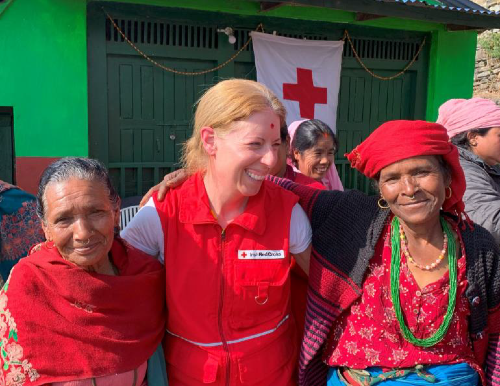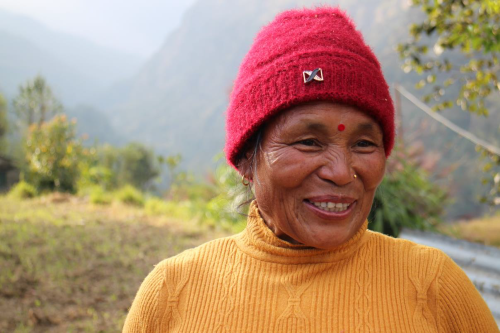The Irish Red Cross is one of the beneficiaries of Fórsa’s International Solidarity fund. James Redmond chats to Anna Marie O’Carroll from the Red Cross about how members’ union subs is empowering people in Nepal to be agents of change in their own lives and the valuable lessons that can be harvested for home.
"When we talk about charity, it often implies a top-down approach," explains Anna Marie straight away. She acknowledges the vital role of emergency relief in times of crisis but sketches out the importance of a practice of empowerment.
“Solidarity, on the other hand, is about walking alongside people,” she says. “It's recognising their inherent strengths, their knowledge and their agency. It's about building partnerships based on mutual respect and shared goals. It's about empowering communities to lead their own development.”
This philosophy underpins their work in Nepal, where the organisation empowers communities through cash grants rather than in-kind donations. Beyond financial support, training is a crucial component of this. Right now, 447 farmers are benefiting from Red Cross training schemes funded by Fórsa.

Anna Marie O’Carroll is the Programme Manager for International Affairs at Irish Red Cross. She’s pictured here with local women in Nepal.
“This includes things like financial literacy, marketing and business planning. We also help them connect with relevant markets, so they have access to sell their products or services,” explains Anna Marie.
A key aspect of their Nepal project is the introduction of climate-smart and high-value crops. Resistance to change was an initial challenge faced by the project. “People are used to growing what their families have always grown, and there can be a fear of trying something new. To address this, we focused on education and demonstrations. We set up trial plots where farmers can see firsthand how these crops perform.”
Anna Marie explains how some people were hesitant at first. They'd seen other projects come and go, and they were weary of empty promises.
“This is where the strength of the Red Cross truly lies,” says Anna Marie. “Our local presence, our social mobilisers and volunteers come from within these very communities. They are a huge bridge between the project and the people. They speak the local languages, understand the cultural nuances and have preexisting relationships built on trust and familiarity.”
Overcoming such challenges and building trust within the communities proved crucial lessons in the power of partnerships for the project.
“They also have existing networks and relationships that we can leverage. These partnerships, and the strength of our volunteer base, has been invaluable to help us navigate challenges and ensure the sustainability of our programs. Later this year as we expand into a new district we'll be taking these lessons learned to heart. We'll be focusing even more on community engagement from the very beginning, ensuring that the project is truly community owned and driven.”
Combating outward rural migration that sees young people fleeing for better opportunities elsewhere is also a huge focus of the programme. The project works to provide viable alternatives by supporting cottage industries and diversified livelihoods.

Riki Maya is a widowed mother of two. With training and a Red Cross microgrant, she started a successful poultry farm, providing a brighter future for her family.
Riki Maya is typical of the people who benefit from these schemes. A widowed mother of two, she started a successful poultry farming business, after accessing training and a cash grant. She can now provide a brighter future for her family from selling eggs and chickens,
“These are small-scale, home-based businesses that allow people to generate income without having to leave their communities. They offer a way to combine traditional skills with modern business practices, creating sustainable livelihoods right where people live. These cottage industries can take many forms for example we’re working with women’s groups to establish a handicraft business producing textiles. We're also supporting the development of honey production, recognizing the potential for these high value products.”
“The key is to identify opportunities that build on existing resources and skills within the community. We don't just provide seed funding and walk away. We offer comprehensive support including training and business management, marketing and financial literacy. We help connect these small businesses with markets both locally and sometimes regionally. We also provide access to micro loans, which can be crucial for scaling up production and expanding operations.”
While outward migration remains a complex challenge, the project is making a difference, often in simple ways like averting the loss of many traditional arts and crafts.
Like anywhere, within Nepal’s rural communities, certain groups—low-income families, female-headed households, disabled people—face even greater challenges. Anna Marie explains how for the Irish Red Cross empowerment is the ultimate goal.
“So how do we do this in practice? Well, it starts with really listening. We conduct detailed community assessments that specifically seek to understand the unique needs and vulnerabilities of different groups. We don't just assume we know what's best. We ask. We talk to women, to people with disabilities, to low-income families, to socially excluded groups, and we hear directly from them about the challenges they face and their aspirations for the future. Ultimately, our goal is to empower these marginalized groups to become agents of their own change.”
People like Anna Marie who work with the Irish Red Cross believe international partnerships can offer valuable lessons. Like with all international solidarity work, there’s a natural degree of reflexive learning involved – it’s not all one way.
“The communities we work with in Nepal often face incredibly challenging circumstances, whether it's the impact of climate change, limited resources, or geographical isolation. Yet they demonstrate an incredible ability to adapt, innovate and find solutions with what they have. It's a powerful reminder of the human capacity for resilience and a challenge is also to reflect on our own responses to adversity.”
Ultimately, Anna Marie believes this kind of cross-cultural exchange fosters a sense of global citizenship. It reminds us that we're all interconnected, and that we have a responsibility to contribute to a more just and sustainable world.
“The lessons we learn in Nepal, the stories we hear and the relationships we build stay with us long after we return home. They shape our thinking, our values, and our actions,” she concludes.
Join a union that wins. Join Fórsa.